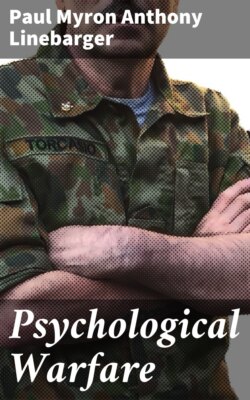Читать книгу Psychological Warfare - Paul Myron Anthony Linebarger - Страница 26
На сайте Литреса книга снята с продажи.
Broad and Narrow Definitions.
ОглавлениеThe term propaganda springs from the name of that department of the Vatican which had the duty of propagating the faith. A multitude of definitions is available. Among Americans, Walter Lippmann, Harold Lasswell and Leonard W. Doob have done some of the most valuable critical, analytical, and historical writing, but a host of other scholars have also made contributions, some of them works of very real importance.15 For the purposes of explaining what this book is about, propaganda may be defined as follows: Propaganda consists of the planned use of any form of communication designed to affect the minds, emotions, and action of a given group for a specific purpose.
This may be called the broad definition, since it would include an appeal to buy Antident toothpaste, to believe in the theological principle of complete immersion,16 to buy flowers for Uncles on Uncles' Day, to slap the Japs, to fight fascism at home, or to smell nice under the arms. All of this is propaganda, by the broad definition. Since War and Navy Department usage never put the Corps of Chaplains, the PX system, the safety campaigns, or the anti-VD announcements under the rubric of propaganda, it might be desirable to narrow down the definition to exclude those forms of propaganda designed to effect private or nonpolitical purposes, and make the definition read:
Propaganda consists of the planned use of any form of public or mass-produced communication designed to affect the minds and emotions of a given group for a specific public purpose, whether military, economic, or political.
This may be termed the everyday definition of propaganda, as it is used in most of the civilian college textbooks.17 For military purposes, however, it is necessary to trim down the definition in one more direction, applying it strictly against the enemy and making it read:
Military propaganda consists of the planned use of any form of communication designed to affect the minds and emotions of a given enemy, neutral or friendly foreign group for a specific strategic or tactical purpose.
Note that if the communication is not planned it cannot be called propaganda. If a lieutenant stuck his head out of a tank turret and yelled at some Japs in a cave, "Come on out of there, you qwertyuiop asdfgs, or we'll zxcvb you all to hjkl, you etc.'s!," the communication may or may not work, but—in the technical sense—it is not propaganda because the lieutenant did not employ that form of communication planned and designed to affect the minds or emotions of the Japanese in the cave. Had the lieutenant given the matter thought and had he said, in the Japanese language, "Enemy persons forthwith commanded to cease resistance, otherwise American Army regrets inescapable consequences attendant upon operation of flamethrower," the remark would have been closer to propaganda.
Furthermore, propaganda must have a known purpose. This element must be included in the definition; a great deal of communication, both in wartime and in peacetime, arises because of the pleasure which it gives to the utterer, and not because of the result it is supposed to effect in the hearers. Sending the Japanese cartoons of themselves, mocking the German language, calling Italians by familiar but inelegant names—such communications cropped up during the war. The senders got a lot of fun out of the message but the purpose was unintelligently considered. The actual effect of the messages was to annoy the enemy, stiffening his will-to-resist. (Screams of rage had a place in primitive war; in modern military propaganda they are too expensive a luxury to be tolerated. Planned annoyance of the enemy does, of course, have its role—a minor, rare and special one.)
"Psychological warfare" is simple enough to understand if it is simply regarded as application of propaganda to the purposes of war, as in the following definition:
Psychological warfare comprises the use of propaganda against an enemy, together with such other operational measures of a military, economic, or political nature as may be required to supplement propaganda.
In this sense, "psychological warfare" is a known operation which was carried on very successfully during World War II under the authority of the Combined and Joint Chiefs of Staff. It is in this sense that some kind of a "Psychological Warfare Unit" was developed in every major theater of war, and that the American military assimilated the doctrines of "psychological warfare."
However, this is only one of several ways of using the term, "psychological warfare." There is, in particular, one other sense, in which the term became unpleasantly familiar, during the German conquest of Europe, the sense of warfare psychologically waged. In the American use of the term, psychological warfare was the supplementing of normal military operations by the use of mass communications; in the Nazi sense of the term, it was the calculation and execution of both political and military strategy on studied psychological grounds. For the American uses, it was modification of traditional warfare by the effective, generous use of a new weapon; for the Germans it involved a transformation of the process of war itself. This is an important enough distinction to warrant separate consideration.
